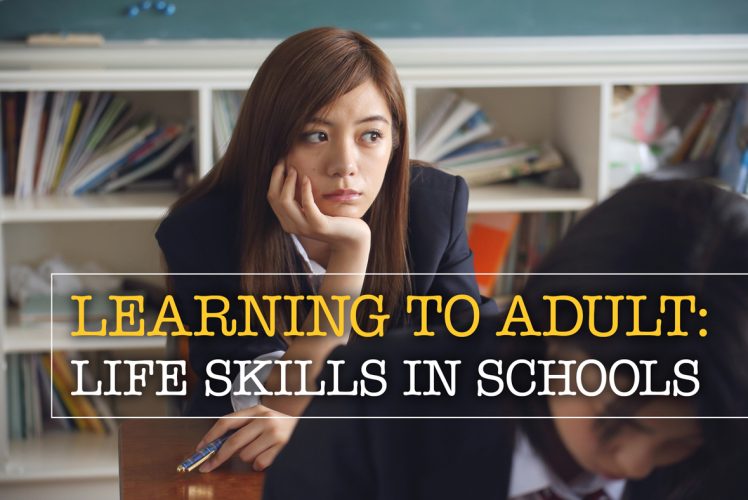
LEARNING TO ADULT – LIFE SKILLS IN SCHOOLS
A recent Monash University survey found that Australians would like to see ‘life skills’ taught in our schools. The kinds of things mentioned ranged from technology and coding (the skills that were considered important for future employment); but also covered budgeting, job preparation and domestic tasks.
The demand for what one survey respondent called ‘learning to adult’ has been reflected in the popularity of community run courses such as those offered by the city of Onkaparinga in South Australia. The council offers life skills classes to young people, that include tax basics, dealing with government agencies and vehicle maintenance – all valuable you would agree.
Whose responsibility?
But is it fair to call on Australian schools to step up and add to the demands of an already crowded curriculum?
And wasn’t it once also the responsibility of parents and indeed the whole community to guide young people successfully into adulthood and all it entails?
What happened?
Decades ago, intergenerational households and communities worked together in the care of children. There was both the time and the opportunity for sharing knowledge and teaching life skills. You know the sort of thing. Kids helping out in the kitchen were soon adept at whipping up scrambled eggs AND cleaning up after themselves. A few pointers from the mechanic down the road on mending a punctured bike tyre, and next time you could fix it yourself. (Try finding a mechanic with the time, or the interest in such a small repair job these days…)
Families are now scattered throughout the country and long working hours and double income households have seen children returning from school to an empty house. Suburbia is not always the haven of community support it once was, and perhaps people don’t have the time anymore. But to blame this on a perceived lack of life skills of young Australians is far too simplistic in the context of today’s world.
Learning to adult in today’s classrooms
Young Australians are ‘learning to adult’ every day in the classroom. When students organise their time and resources, research and hand in assignments, interact with their peers and participate in extra curricula activities they are honing important life skills such as socialising, effective communication, co-operation, self-censorship and responsibility.
Every educator and every subject on the curriculum serves to inculcate the skills and attitudes that are necessary in navigating the ‘adult’ world and ‘adult’ responsibilities. STEM, Humanities and the Arts are all valuable and important. They provide ‘hands-on’ practical knowledge or the tools to tap the cannon of our understanding so that students can engage with reason, critical and creative thinking. To remove any of these subjects from the curriculum would be self-defeating.
Technology has changed the way we live, work and learn
The information age has provided young Australians with many alternatives for learning. Imparting ‘life skills’ is not only the domain and responsibility of schools, but is also a joint effort between families, the community, industry and government.
Along with Australia’s excellent mandatory education system, young people have other avenues to learn the skills they need, and also what interests them. It is a matter of understanding where to search, and understanding where to search is a part of ‘learning to adult’.
The Internet is crowded with videos with explanations of everything from boiling an egg to fibre glassing an in ground swimming pool. Online learning hubs, communities and social media platforms, offer short courses and support in everything from writing a killer CV to penning your first novel.
Government department websites offer step-by-step instructions and advice on filling out tax forms, applying for grants, filing a complaint or preparing a household budget. Local councils offer community courses and there is the rising popularity of grass roots organisations filled with passionate individuals willing to share their skills and knowledge with young Australians.
No need to panic
Those who lament the lack of ‘life skills’ being taught in today’s schools lack an understanding of just what the curriculum covers, and often miss the point. Life skills are being taught in Australian schools, but there is always room for improvement and new ideas; and of course, the needs and context of every school will differ. But ‘learning to adult’ is about so much more than learning to fill out government forms, apply for housing and changing the washer on a leaky tap.
Browse the PERSONAL DEVELOPMENT, WORK SKILLS, COMMUNICATION, THE WORKPLACE and MONEY modules of the Work-Ready Program for practical advice, information and activities for students to brush up on their ‘life skills’. You will also find links to handy government websites.
If you want to read more about the ‘life skills’ debate, here are a couple of interesting articles.
Aussies want ‘life skills’ taught in school, Monash University research shows, Ashley Argoon, Herald Sun, Feb 21, 2019.
‘How to adult’ classes offered in Adelaide to teach young people basic life skills, Cameron Slessor, ABC News, Thurs 21 Feb, 2019
www.abc.net.au/news/2019-02-21/should-young-australians-take-how-to-adult-classes/10755354




